新概念英语第一册Lesson113-114(共29张PPT)
文档属性
| 名称 | 新概念英语第一册Lesson113-114(共29张PPT) | 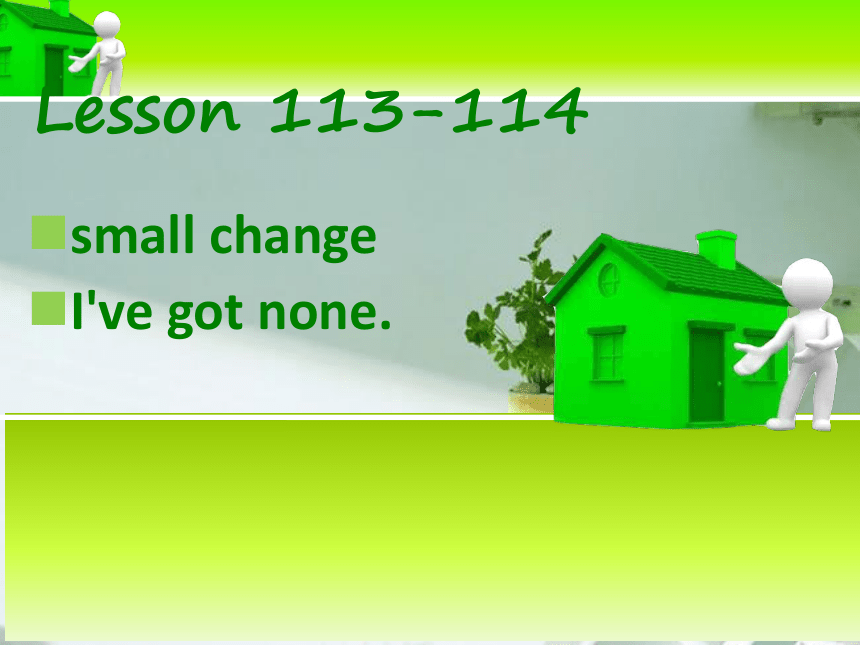 | |
| 格式 | ppt | ||
| 文件大小 | 938.0KB | ||
| 资源类型 | 教案 | ||
| 版本资源 | 新概念英语 | ||
| 科目 | 英语 | ||
| 更新时间 | 2024-04-09 09:32:20 | ||
图片预览


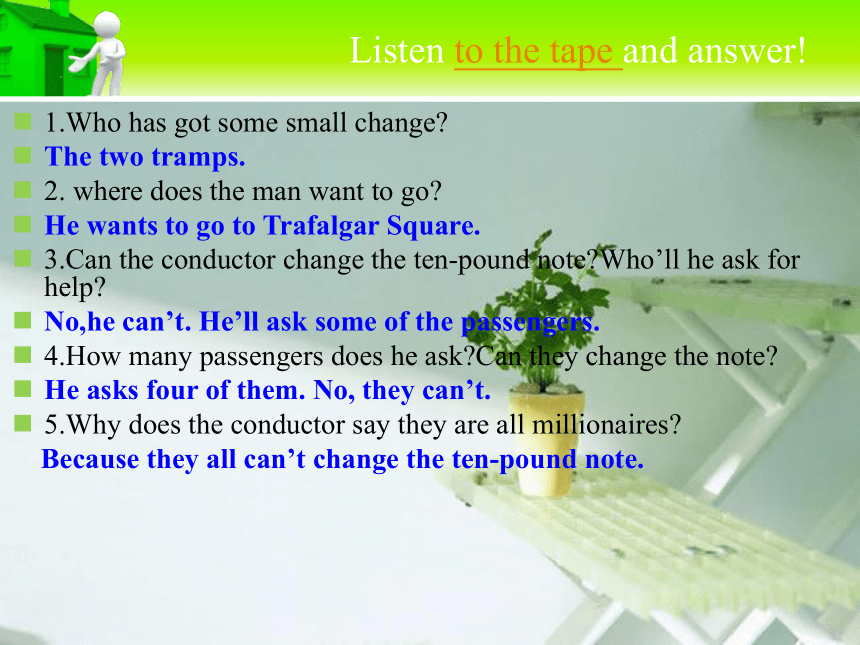
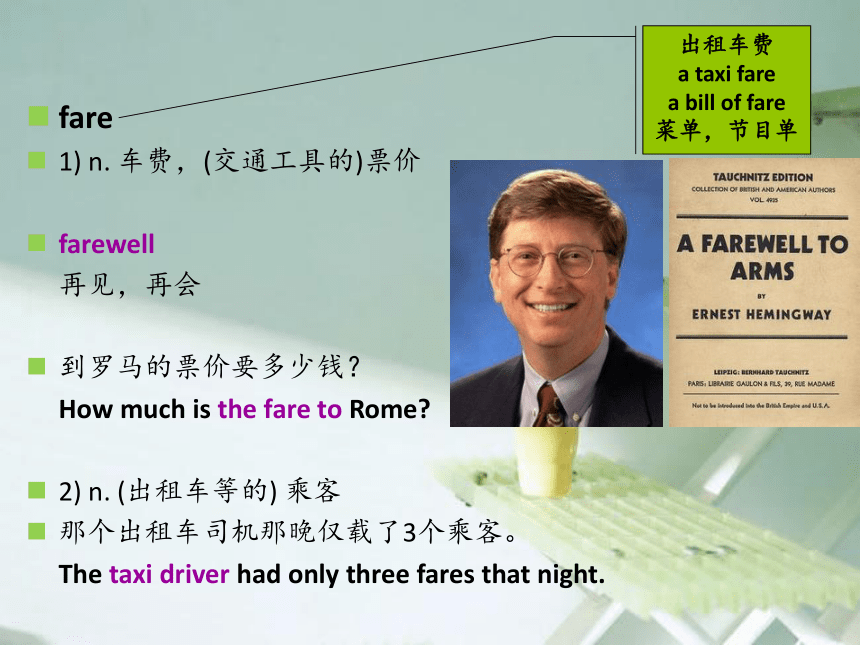
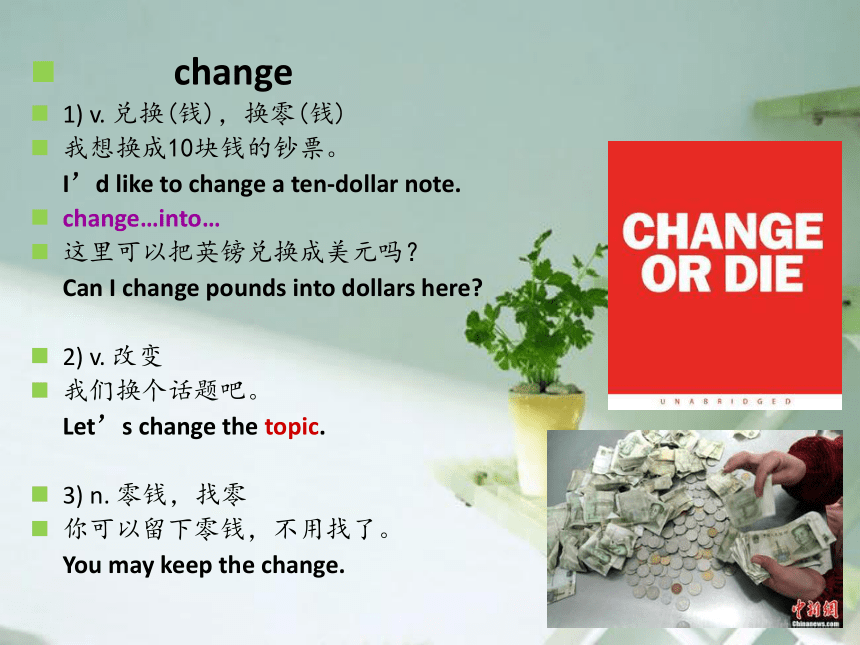
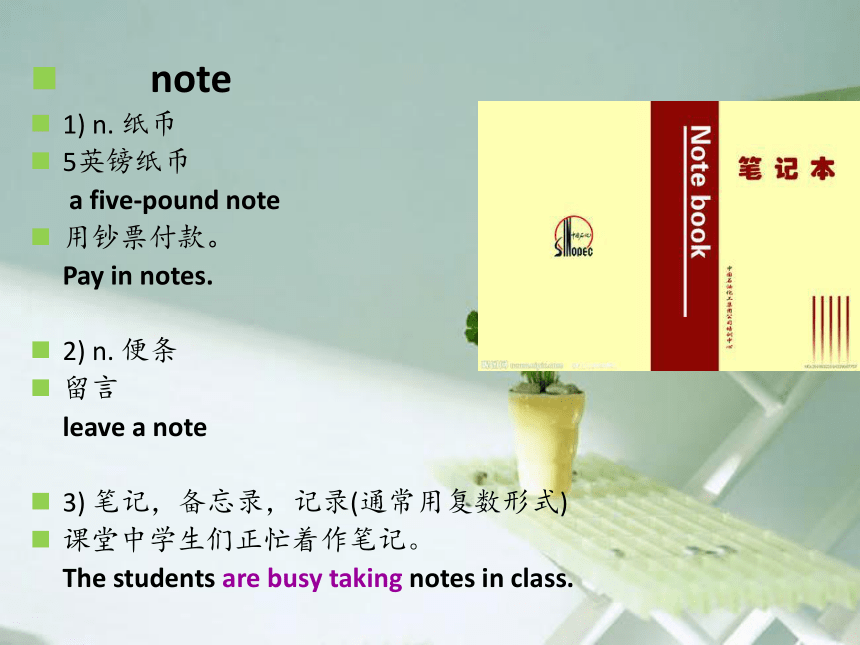
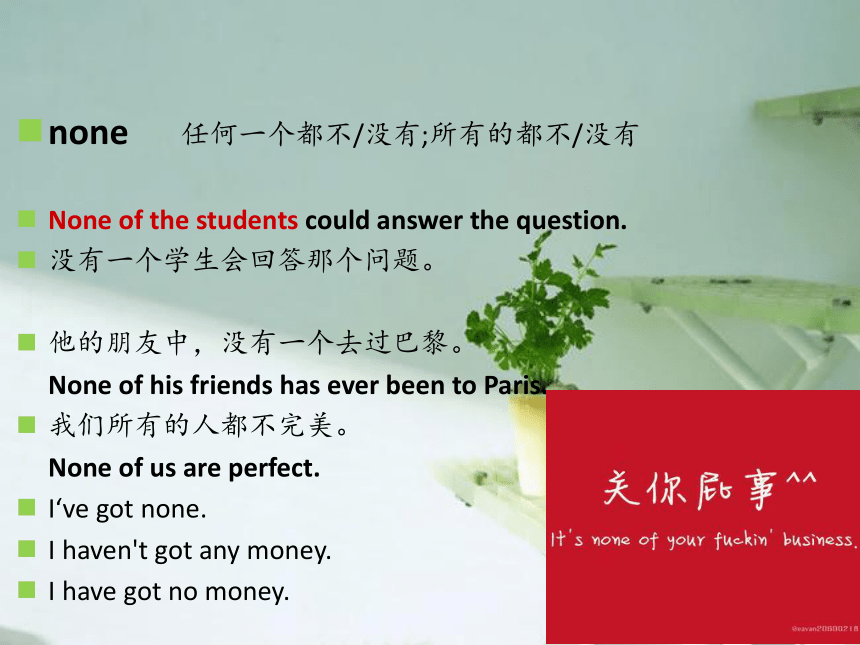
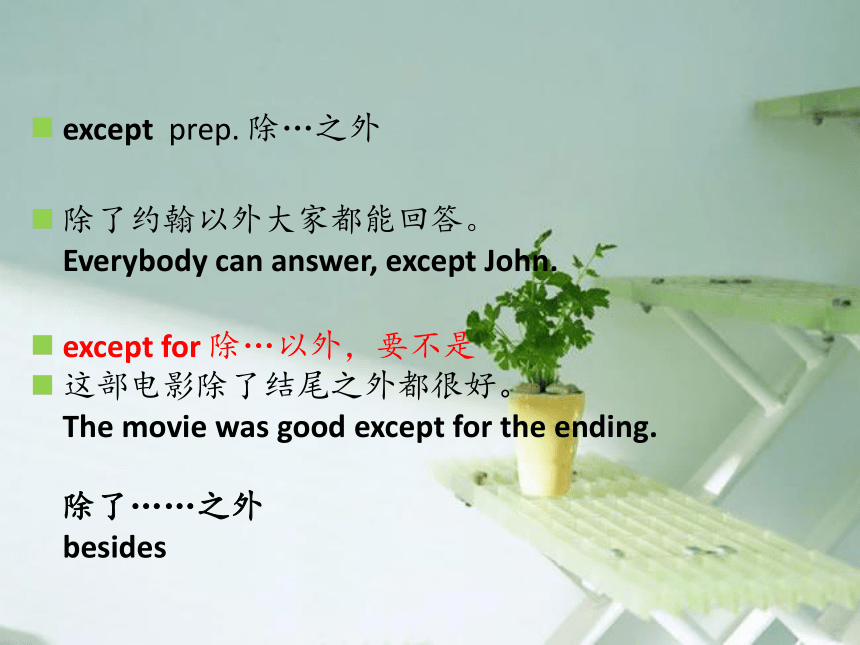
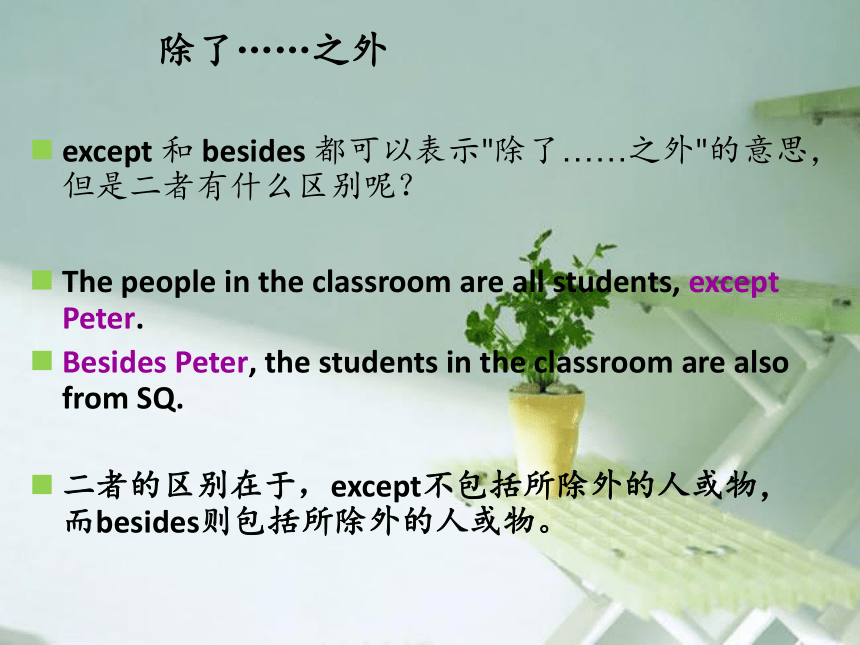
文档简介
(共29张PPT)
Lesson 113-114
small change
I've got none.
conductor n. 售票员
fare n. 车费,车票
change v. 兑换
note n. 纸币
passenger n. 乘客
none pron. 没有任何东西
neither adv. 也不
get off 下车
tramp n. 流浪汉
except prep. 除…外
Listen to the tape and answer!
1.Who has got some small change
The two tramps.
2. where does the man want to go
He wants to go to Trafalgar Square.
3.Can the conductor change the ten-pound note Who’ll he ask for help
No,he can’t. He’ll ask some of the passengers.
4.How many passengers does he ask Can they change the note
He asks four of them. No, they can’t.
5.Why does the conductor say they are all millionaires
Because they all can’t change the ten-pound note.
fare
1) n. 车费,(交通工具的)票价
farewell
再见,再会
到罗马的票价要多少钱?
How much is the fare to Rome
2) n. (出租车等的) 乘客
那个出租车司机那晚仅载了3个乘客。
The taxi driver had only three fares that night.
出租车费
a taxi fare
a bill of fare
菜单,节目单
change
1) v. 兑换(钱),换零(钱)
我想换成10块钱的钞票。
I’d like to change a ten-dollar note.
change…into…
这里可以把英镑兑换成美元吗?
Can I change pounds into dollars here
2) v. 改变
我们换个话题吧。
Let’s change the topic.
3) n. 零钱,找零
你可以留下零钱,不用找了。
You may keep the change.
note
1) n. 纸币
5英镑纸币
a five-pound note
用钞票付款。
Pay in notes.
2) n. 便条
留言
leave a note
3) 笔记,备忘录,记录(通常用复数形式)
课堂中学生们正忙着作笔记。
The students are busy taking notes in class.
none 任何一个都不/没有;所有的都不/没有
None of the students could answer the question.
没有一个学生会回答那个问题。
他的朋友中,没有一个去过巴黎。
None of his friends has ever been to Paris.
我们所有的人都不完美。
None of us are perfect.
I‘ve got none.
I haven't got any money.
I have got no money.
except prep. 除…之外
除了约翰以外大家都能回答。
Everybody can answer, except John.
except for 除…以外,要不是
这部电影除了结尾之外都很好。
The movie was good except for the ending.
除了……之外
besides
除了……之外
except 和 besides 都可以表示"除了……之外"的意思,但是二者有什么区别呢?
The people in the classroom are all students, except Peter.
Besides Peter, the students in the classroom are also from SQ.
二者的区别在于,except不包括所除外的人或物,而besides则包括所除外的人或物。
Haven’t you got any small change
反意疑问句,表示人的惊奇不满或愤怒等情绪。
难道你自己不会做吗?
Can’t you do it yourself
难道你不想和我们一起去吗?
Don’t you want to go with us
Have got = have
Change 零钱
I’m very sorry, sir. You must get off the bus. None of our passengers can change this note. They’re all millionaires!
get off the bus 下车 / get on the bus 上车
get into the car 上小汽车 /get out of the car 下小汽车
all 所有人(三个或三个以上的人或物):他们都喜欢巴黎.
They all like Paris.
both都(用在两个人或物中):他们两个都喜欢巴黎。
They both like Paris.
neither 两者都不…(置于单数名词之前)
Neither boy is from Beijing.
两个男孩儿没一个是来自北京的。
Neither of the 2 boys is from Beijing.
1. 可以单独使用,也可以与of连用。
2. Neither of 后的名词是复数,而谓语动词是单数形式。
3. 反义词是both
8) neither +谓语+主语 表示主语也不
Jim can't swim,neither can I.
Jim isn't good at English,neither am I.
Jim doesn't like red,neither do I.
so+谓语+主语 表示主语也是
Jim can swim,so can I.
Jim is good at English,so am I.
Jim likes red,so do I.
=either
=too
9) hundred thousand million billion
百
千
百万
十亿
数字+hundred
hundreds of
几百
数以百计的
[ θa z nd]
['milj n]
[ bilj n]
练习(用neither改写)
1. I don’t want any tea.
- Neither do I.
2. I wasn’t tired this morning.
- Neither was I.
3. I can’t speak French.
- Neither can I.
4. I didn’t buy a new car last year.
- Neither did I.
5. I haven’t got a headache.
- Neither have I.
练习用so改写
1. I want some coffee.
- So do I.
2. I was at the party last night.
- So was I.
3. I can swim very well.
- So can I.
4. I saw George last night.
- So did I.
5. I have got a cold.
- So have I.
so, neither引导的简短回答
以so,neither引导的简短回答,必须用倒装形式.
So/ Neither+助动词/be动词/情态动词+主语.
假如前一句是肯定的,后一句用so开头,
假如前一句是否定句,后一句用neither/nor开头,
前后句的时态要保持一致.
1.I'm hungry.
So am I.=I am hungry, too.
2.I want some coffee.
So do I.
3.I'm not tired.
Neither am I.=I am not tired, either.
4.I don't want any tea.
Nor do I.
A: Have you got any chocolate
B: Yes, I’ve got some.
C: So have I.
water
bread
biscuits
coke
表达自己情况与他人相同(对方肯定句)
So + V.(根据问句确定)+ I
I am a teacher.
So am I.
I can swim.
So can I.
I like chocolate.
So do I.
I went to the park yesterday morning.
So did I.
Be 动词
情态动词
实意动词(现)
实意动词(过)
So + V.(根据问句确定)+I
I will go fishing tomorrow.
___________________
I can swim.
___________________
I am very happy about the news.
___________________
I sent her a birthday card.
___________________
I have many interesting books.
___________________
So will I.
So can I.
So am I.
So did I.
So do I.
A: Have you got any chocolate
B: No, I haven’t got any.
C: Neither have I.
water
bread
biscuits
coke
表达自己情况与他人相同(对方否定句)
Neither + V.(根据问句确定)+ I
I’m not a conductor.
Neither ------.
I won’t take a plane there.
Neither -----.
I don’t want to go to that restaurant.
Neither -----.
I didn’t watch Olympic games last night.
Neither -----.
text
CONDUCTOR: Fares, please!
MAN: Trafalgar Square, please.
CONDUCTOR: I'm sorry, sir. I can't change a ten-pound note. Haven't you got any small change
MAN: I've got no small change, I am afraid.
CONDUCTOR: I'll ask some of the passengers.
CONDUCTOR: Have you any small change, sir
1st PASSENGER: I'm sorry. I've got none.
2nd PASSENGER: I haven't got any either.
CONDUCTOR: Can you change this ten-pound note,madam
3rd PASSENGER: I'm afraid I can't.
4th PASSENGER: Neither can I.
CONDUCTOR: I'm very sorry, sir. You must get off the bus. None of our passengers can change this note.They're all millionaires!
TWO TRAMPS: Except us.
1sth TRAMP: I've got some small change.
2nd TRAMP: So have I.
用所给单词的适当形式填空
1. Which city do you like ______ (well), Beijing or Shanghai
2. Beijing is one of ______ (beautiful) cities in China.
3. ______ (no)of us would like to try it.
4. They are all ______ (million).
5. I’ll ask some of the ______ (passenger).
6. All go there except ______ (we).
7. The ______ (two) passenger hasn’t got any small change, either.
8. I haven’t any, either. ______ (either) have I.
9. They are too expensive for us ______ (afford).
10. Can we buy it on ______ (instalment)
选择填空
( )1. ______ of them has lunch at school.
A. No B. No one C. Nobody D. None
( ) 2. No one was interested in it ______ him.
A. for B. of C. except D. beside
( ) 3. There is ______ time left.
We must hurry.
A. little B. a little C. few D. a few
( ) 4. You must take ______ in class.
A. paper B. diary C. notes D. writing
( ) 5. I’ve got ______ small change, I’m afraid.
A. neither B. none C. no D. no one
( ) 6. I like Chinese food. What about you
______.
A. So did I B. So didn’t I C. So do I D. So don’t I
( ) 7. Either my parents or my grandmother ______ me ______ my English after supper every day.
A. help, with B. helps, with C. help, study D. helps, for
( ) 8. Both of them are not good at singing.
______ of them ______ good at singing.
A. None, is B. No one, it C. Neither, is D. Neither, are
( ) 9. Beijing duck is ______ food in Beijing.
A. more, popular B. popularest C. much nicer D. the most popular
( ) 10. They didn’t cook at home. ______ we.
A. So did B. Neither did C. So do D. Neither do
句型转换
1. We aren’t all happy to see you. (变为同义句)
______ of us is happy to see you.
2. My father doesn’t understand English.
My mother doesn’t understand English, either.(两句合并为一句)
______ my father ______ my mother ______ English.
3. Jane is a doctor. Finn is a doctor, too. (改为同义句)
(1) Li Lei is a doctor.
______ ______ Finn.
(2) ______ Jane ______ Finn ______ doctors.
4. None of the students go to bed early.(就划线部分提问)
______ ______ of the students go to bed early
5. All the passenger can’t change this ten-pound note.
Only the two tramps can. (两句合并为一句)
______ of the passenger can change this ten-pound note ______ the two tramps
6. We can go to the park or go to the cinema. (变为同义句)
We can go ______ to the park ______ to the cinema.
7. Let’s ask the policeman over there.(变为反意疑问句)
Let’s ask the policeman over there, ______ ______
Lesson 113-114
small change
I've got none.
conductor n. 售票员
fare n. 车费,车票
change v. 兑换
note n. 纸币
passenger n. 乘客
none pron. 没有任何东西
neither adv. 也不
get off 下车
tramp n. 流浪汉
except prep. 除…外
Listen to the tape and answer!
1.Who has got some small change
The two tramps.
2. where does the man want to go
He wants to go to Trafalgar Square.
3.Can the conductor change the ten-pound note Who’ll he ask for help
No,he can’t. He’ll ask some of the passengers.
4.How many passengers does he ask Can they change the note
He asks four of them. No, they can’t.
5.Why does the conductor say they are all millionaires
Because they all can’t change the ten-pound note.
fare
1) n. 车费,(交通工具的)票价
farewell
再见,再会
到罗马的票价要多少钱?
How much is the fare to Rome
2) n. (出租车等的) 乘客
那个出租车司机那晚仅载了3个乘客。
The taxi driver had only three fares that night.
出租车费
a taxi fare
a bill of fare
菜单,节目单
change
1) v. 兑换(钱),换零(钱)
我想换成10块钱的钞票。
I’d like to change a ten-dollar note.
change…into…
这里可以把英镑兑换成美元吗?
Can I change pounds into dollars here
2) v. 改变
我们换个话题吧。
Let’s change the topic.
3) n. 零钱,找零
你可以留下零钱,不用找了。
You may keep the change.
note
1) n. 纸币
5英镑纸币
a five-pound note
用钞票付款。
Pay in notes.
2) n. 便条
留言
leave a note
3) 笔记,备忘录,记录(通常用复数形式)
课堂中学生们正忙着作笔记。
The students are busy taking notes in class.
none 任何一个都不/没有;所有的都不/没有
None of the students could answer the question.
没有一个学生会回答那个问题。
他的朋友中,没有一个去过巴黎。
None of his friends has ever been to Paris.
我们所有的人都不完美。
None of us are perfect.
I‘ve got none.
I haven't got any money.
I have got no money.
except prep. 除…之外
除了约翰以外大家都能回答。
Everybody can answer, except John.
except for 除…以外,要不是
这部电影除了结尾之外都很好。
The movie was good except for the ending.
除了……之外
besides
除了……之外
except 和 besides 都可以表示"除了……之外"的意思,但是二者有什么区别呢?
The people in the classroom are all students, except Peter.
Besides Peter, the students in the classroom are also from SQ.
二者的区别在于,except不包括所除外的人或物,而besides则包括所除外的人或物。
Haven’t you got any small change
反意疑问句,表示人的惊奇不满或愤怒等情绪。
难道你自己不会做吗?
Can’t you do it yourself
难道你不想和我们一起去吗?
Don’t you want to go with us
Have got = have
Change 零钱
I’m very sorry, sir. You must get off the bus. None of our passengers can change this note. They’re all millionaires!
get off the bus 下车 / get on the bus 上车
get into the car 上小汽车 /get out of the car 下小汽车
all 所有人(三个或三个以上的人或物):他们都喜欢巴黎.
They all like Paris.
both都(用在两个人或物中):他们两个都喜欢巴黎。
They both like Paris.
neither 两者都不…(置于单数名词之前)
Neither boy is from Beijing.
两个男孩儿没一个是来自北京的。
Neither of the 2 boys is from Beijing.
1. 可以单独使用,也可以与of连用。
2. Neither of 后的名词是复数,而谓语动词是单数形式。
3. 反义词是both
8) neither +谓语+主语 表示主语也不
Jim can't swim,neither can I.
Jim isn't good at English,neither am I.
Jim doesn't like red,neither do I.
so+谓语+主语 表示主语也是
Jim can swim,so can I.
Jim is good at English,so am I.
Jim likes red,so do I.
=either
=too
9) hundred thousand million billion
百
千
百万
十亿
数字+hundred
hundreds of
几百
数以百计的
[ θa z nd]
['milj n]
[ bilj n]
练习(用neither改写)
1. I don’t want any tea.
- Neither do I.
2. I wasn’t tired this morning.
- Neither was I.
3. I can’t speak French.
- Neither can I.
4. I didn’t buy a new car last year.
- Neither did I.
5. I haven’t got a headache.
- Neither have I.
练习用so改写
1. I want some coffee.
- So do I.
2. I was at the party last night.
- So was I.
3. I can swim very well.
- So can I.
4. I saw George last night.
- So did I.
5. I have got a cold.
- So have I.
so, neither引导的简短回答
以so,neither引导的简短回答,必须用倒装形式.
So/ Neither+助动词/be动词/情态动词+主语.
假如前一句是肯定的,后一句用so开头,
假如前一句是否定句,后一句用neither/nor开头,
前后句的时态要保持一致.
1.I'm hungry.
So am I.=I am hungry, too.
2.I want some coffee.
So do I.
3.I'm not tired.
Neither am I.=I am not tired, either.
4.I don't want any tea.
Nor do I.
A: Have you got any chocolate
B: Yes, I’ve got some.
C: So have I.
water
bread
biscuits
coke
表达自己情况与他人相同(对方肯定句)
So + V.(根据问句确定)+ I
I am a teacher.
So am I.
I can swim.
So can I.
I like chocolate.
So do I.
I went to the park yesterday morning.
So did I.
Be 动词
情态动词
实意动词(现)
实意动词(过)
So + V.(根据问句确定)+I
I will go fishing tomorrow.
___________________
I can swim.
___________________
I am very happy about the news.
___________________
I sent her a birthday card.
___________________
I have many interesting books.
___________________
So will I.
So can I.
So am I.
So did I.
So do I.
A: Have you got any chocolate
B: No, I haven’t got any.
C: Neither have I.
water
bread
biscuits
coke
表达自己情况与他人相同(对方否定句)
Neither + V.(根据问句确定)+ I
I’m not a conductor.
Neither ------.
I won’t take a plane there.
Neither -----.
I don’t want to go to that restaurant.
Neither -----.
I didn’t watch Olympic games last night.
Neither -----.
text
CONDUCTOR: Fares, please!
MAN: Trafalgar Square, please.
CONDUCTOR: I'm sorry, sir. I can't change a ten-pound note. Haven't you got any small change
MAN: I've got no small change, I am afraid.
CONDUCTOR: I'll ask some of the passengers.
CONDUCTOR: Have you any small change, sir
1st PASSENGER: I'm sorry. I've got none.
2nd PASSENGER: I haven't got any either.
CONDUCTOR: Can you change this ten-pound note,madam
3rd PASSENGER: I'm afraid I can't.
4th PASSENGER: Neither can I.
CONDUCTOR: I'm very sorry, sir. You must get off the bus. None of our passengers can change this note.They're all millionaires!
TWO TRAMPS: Except us.
1sth TRAMP: I've got some small change.
2nd TRAMP: So have I.
用所给单词的适当形式填空
1. Which city do you like ______ (well), Beijing or Shanghai
2. Beijing is one of ______ (beautiful) cities in China.
3. ______ (no)of us would like to try it.
4. They are all ______ (million).
5. I’ll ask some of the ______ (passenger).
6. All go there except ______ (we).
7. The ______ (two) passenger hasn’t got any small change, either.
8. I haven’t any, either. ______ (either) have I.
9. They are too expensive for us ______ (afford).
10. Can we buy it on ______ (instalment)
选择填空
( )1. ______ of them has lunch at school.
A. No B. No one C. Nobody D. None
( ) 2. No one was interested in it ______ him.
A. for B. of C. except D. beside
( ) 3. There is ______ time left.
We must hurry.
A. little B. a little C. few D. a few
( ) 4. You must take ______ in class.
A. paper B. diary C. notes D. writing
( ) 5. I’ve got ______ small change, I’m afraid.
A. neither B. none C. no D. no one
( ) 6. I like Chinese food. What about you
______.
A. So did I B. So didn’t I C. So do I D. So don’t I
( ) 7. Either my parents or my grandmother ______ me ______ my English after supper every day.
A. help, with B. helps, with C. help, study D. helps, for
( ) 8. Both of them are not good at singing.
______ of them ______ good at singing.
A. None, is B. No one, it C. Neither, is D. Neither, are
( ) 9. Beijing duck is ______ food in Beijing.
A. more, popular B. popularest C. much nicer D. the most popular
( ) 10. They didn’t cook at home. ______ we.
A. So did B. Neither did C. So do D. Neither do
句型转换
1. We aren’t all happy to see you. (变为同义句)
______ of us is happy to see you.
2. My father doesn’t understand English.
My mother doesn’t understand English, either.(两句合并为一句)
______ my father ______ my mother ______ English.
3. Jane is a doctor. Finn is a doctor, too. (改为同义句)
(1) Li Lei is a doctor.
______ ______ Finn.
(2) ______ Jane ______ Finn ______ doctors.
4. None of the students go to bed early.(就划线部分提问)
______ ______ of the students go to bed early
5. All the passenger can’t change this ten-pound note.
Only the two tramps can. (两句合并为一句)
______ of the passenger can change this ten-pound note ______ the two tramps
6. We can go to the park or go to the cinema. (变为同义句)
We can go ______ to the park ______ to the cinema.
7. Let’s ask the policeman over there.(变为反意疑问句)
Let’s ask the policeman over there, ______ ______
同课章节目录
